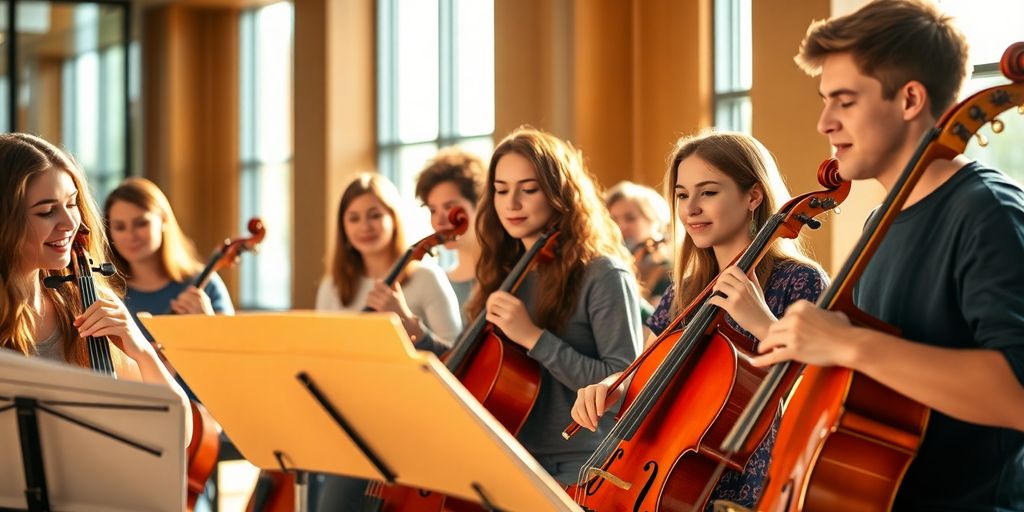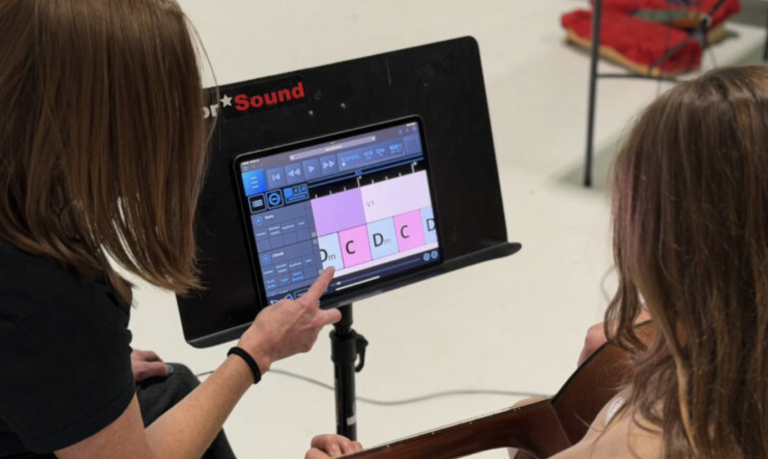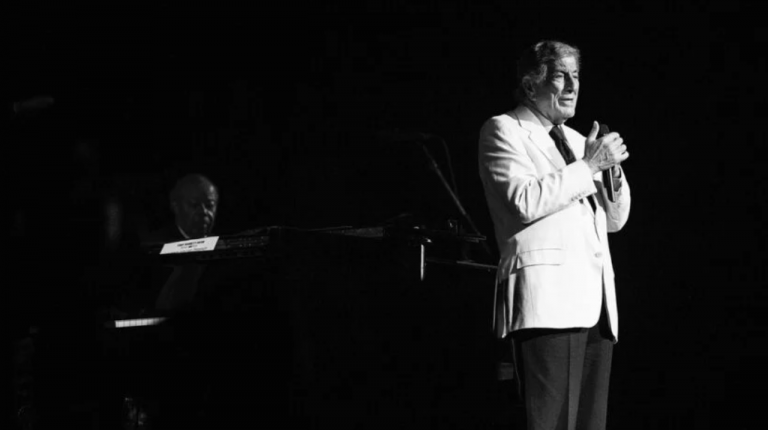
Berklee University of Music has really made its mark in the world of music education since it first opened. It quickly became a central spot for musicians and music professionals alike. Berklee has helped a ton of artists with its focus on current music and new ways of teaching. It has also helped change the music world everywhere. This article looks at Berklee’s past, its new programs, and the varied group of people that make it a top music school.
Key Takeaways
- Berklee University of Music started out as Schillinger House in 1945, focusing on jazz music.
- The school has changed a lot to include modern music classes and new tech.
- Many well-known people, including Grammy winners, have come from Berklee.
- Berklee is really into being open to everyone and helps artists from all kinds of backgrounds.
- The university works with other schools and has places all over the world, showing how far it reaches.
Historical Significance of Berklee University of Music
Founding and Early Years
So, Berklee didn’t just appear overnight. Back in 1945, Lawrence Berk had an idea. He bought a building on Newbury Street and started a music school. He named it Schillinger House, after his mentor. It was a big deal because it was the first place that focused on jazz. Lawrence Berk’s early vision was groundbreaking. He was an MIT-trained engineer who left a stable job to teach music full-time. He didn’t expect to start a school, but talented kids kept finding him. His best students became teachers, and that’s how the school got going. Nine years later, he renamed it Berklee, after his son, Lee Eliot Berk. It was the first higher education institution in the U.S. founded on the study of jazz, which was the popular music of that time. Around that time, in November 1945, Charlie Parker recorded “Ko Ko,” one of his early masterpieces. It was a wild time for music, and Berklee was right there.
Berklee’s beginnings were humble, but its focus on contemporary music, especially jazz, set it apart from traditional conservatories. This approach laid the groundwork for its future influence on music education and the industry.
Influence on Jazz and Popular Music
Berklee’s impact on jazz and popular music is huge. They were one of the first to take jazz seriously as an academic subject. This helped legitimize the genre and brought it into the mainstream of music education. But it wasn’t just jazz. As popular music evolved, so did Berklee. They embraced rock, pop, R&B, and other genres. This meant that students weren’t just learning about historical music; they were learning about the music that was happening right now. Many alumni went on to become major players in these genres, shaping the sound of popular music for decades. For example, you can find many Berklee Online students who have gone on to achieve great things. They helped bridge the gap between academic music and the music people actually listen to every day. It’s a big part of why they’re so well-known today.
Shaping the Music Industry
Berklee has always been about preparing students for the real world of music. They understood that the music industry was changing fast, and they needed to keep up. This meant teaching students about things like music production, songwriting, and even the business side of music. They also started incorporating new technologies into their curriculum, understanding that it was becoming an integral part of music creation and performance. This meant Berklee was always a step ahead, adapting to new trends and ensuring its graduates were ready for the real world. The school’s commitment to a broad and relevant curriculum is a big part of why it’s so well-regarded today. They understood that music education programs needed to evolve, and they were at the forefront of that change.
The Evolution of Berklee University of Music

From Schillinger House to Berklee
Berklee’s story didn’t begin overnight. Back in 1945, Lawrence Berk, a forward-thinking individual, founded a music school called Schillinger House, named after his mentor. This institution revolutionized music education by prioritizing jazz music. Before this, classical music dominated most music schools. Schillinger House, though small, had a clear mission: to equip musicians with the practical skills needed for contemporary music. It was a bold move, especially after World War II, as returning GIs sought new skills, including music. The school quickly gained a reputation for its practical approach, shifting from theory to performance and composition for popular music. This laid the foundation for everything that followed.
Berklee’s humble beginnings and focus on contemporary music, especially jazz, distinguished it from traditional conservatories. This forward-thinking approach set the stage for its future influence on music education and the industry.
Leadership and Growth Under Lee Berk
Things really took off when Lawrence Berk’s son, Lee Berk, became involved. He joined in the late 1960s, a time of significant change. The school had just moved to a new location and was transitioning from a private business to a non-profit. This was a huge step because it meant they could apply for accreditation and start offering degrees, not just certificates. Lee Berk was instrumental in this process. He helped guide the school through these administrative hurdles, which allowed Berklee to expand its music education programs.
Expanding Educational Horizons
Berklee didn’t stay the same; it evolved with the times. From its initial focus on jazz, the school gradually expanded its curriculum to include other contemporary music styles. This wasn’t just about adding new classes; it was about rethinking how music was taught. They started bringing in things like:
- Music production
- Songwriting
- Music business
This made Berklee a pioneer in modern music education. They weren’t just teaching classical theory; they were preparing students for the real world of music. This evolution was key to their continued relevance and success. It also meant that students could get a more well-rounded education, covering everything from performance to the business side of things. This approach really helped shape what music education looks like today.
Innovative Programs and Curriculum at Berklee University of Music

Berklee’s curriculum isn’t stuck in the past; it’s a hub for musical innovation. They’re always cooking up new programs and tweaking existing ones to keep up with the ever-changing music scene. It’s not just about learning scales and chords (though that’s important too!), it’s about pushing boundaries and exploring new sounds.
Evolution of Music Education
Berklee has really changed how people think about music education. They were one of the first schools to treat contemporary music seriously, like jazz, rock, and pop. This helped these genres gain respect in academic circles. They didn’t just stick to classical music; they embraced what was happening in the real world. This forward-thinking approach is a big part of what makes Berklee stand out.
Adapting to Industry Changes
The music industry is a wild place, always changing. Berklee gets this, and they’re constantly updating their programs to reflect what’s happening. It’s not enough to just be good at playing an instrument; you also need to know about music production, songwriting, and the business side of things. They’ve added courses in areas like film scoring and electronic music production to help students stay ahead of the curve. Berklee is always trying to stay relevant and give students the skills they need to succeed. They understand the importance of instrumental or vocal performance in today’s music landscape.
Preparing for Diverse Music Careers
Berklee understands that there’s no one-size-fits-all path in music. They prepare students for all sorts of careers, from performing and composing to producing and teaching. They offer a wide range of courses and programs to help students find their niche. It’s not just about becoming a rock star (though that’s an option too!); it’s about finding a way to make a living doing what you love. They also emphasize the importance of networking and collaboration, which are essential for success in the music industry.
Berklee’s approach to music education is all about giving students the tools they need to succeed in a competitive industry. They focus on practical skills, real-world experience, and a deep understanding of the music business. This helps students not only become great musicians but also successful entrepreneurs.
Berklee University of Music’s Global Reach
Berklee isn’t just confined to Boston; it’s become a real global force in music education. They’ve worked hard to extend their influence beyond the U.S., connecting with musicians and cultures worldwide. It’s impressive how they’ve built such a broad network.
International Partnerships and Campuses
Berklee has definitely gone global with its campuses. The Valencia campus in Spain is a major hub, offering master’s programs and study abroad options. It’s a place where students from all over can come together and learn about music in a different cultural setting. It’s not just a copy of the Boston school; it’s got its own vibe, reflecting the city and the students there. Beyond that, Berklee also teams up with artists from around the globe. These collaborations can be anything from masterclasses and workshops to joint performances. It’s a way for students to learn directly from established musicians who bring different styles and ideas to the table. Berklee Global, the Latin Grammy Cultural Foundation, and Rec Música partnered to create a program for musicians, focusing on integrated skills.
Cultural Exchange Through Music
Berklee runs a bunch of cultural exchange programs that let students really get into different musical traditions. These programs might involve studying abroad, going to international festivals, or working with local musicians in other countries. The whole idea is to give students firsthand experience with different musical cultures and help them appreciate how diverse musical expression can be. It’s about breaking down walls and building bridges through music. It’s not just about being a great music school in Boston; it’s about being a global center for music education and cultural exchange. It’s important for musicians to know about different musical traditions and to be able to work with artists from all over the world. It just makes the music better.
Alumni as Global Ambassadors
Berklee alumni are a big part of this global community, acting as ambassadors for the school and pioneers in music. They’re out there in the world, performing, teaching, and creating, and they’re taking what they learned at Berklee with them. They’re also helping to connect Berklee with new communities and cultures. They are a testament to the school’s global impact. Many Berklee alumni have won big awards like Grammys and have really changed the music world.
Berklee’s journey from a small jazz school to a global music university is a testament to its adaptability and foresight. It consistently anticipated the needs of the music industry, adjusting its curriculum and approach to remain relevant and impactful. This proactive stance allowed it to not only survive but thrive through decades of musical and technological shifts, always putting the student’s future at the center of its mission.
Shaping the Future of Music Education at Berklee University of Music
Embracing New Technologies
Berklee is really stepping up its game when it comes to tech. It’s not just about learning to play an instrument anymore; it’s about understanding how technology impacts every aspect of music creation and distribution. They’re integrating things like AI, virtual reality, and advanced audio software into the curriculum. This helps students stay ahead of the curve and be ready for the ever-changing music landscape. They’re also exploring new ways to teach music online, making education more accessible to students around the globe. It’s a big shift, but it’s necessary to keep up with the times.
- Offering courses in music production using cutting-edge software.
- Integrating AI tools for composition and arrangement.
- Exploring virtual reality for immersive music experiences.
Fostering Entrepreneurship in Music
It’s not enough to just be a talented musician these days. You also have to be a savvy businessperson. Berklee gets that, and they’re really pushing students to think like entrepreneurs. They’re offering courses on things like music business, marketing, and intellectual property. The goal is to give students the skills they need to launch their own careers, whether that’s starting a band, launching a record label, or developing a new music app. They even have programs that provide funding and mentorship to student startups. It’s all about empowering students to take control of their own destinies. music education programs are evolving to include business acumen.
Berklee is working to create an environment where students can experiment, take risks, and learn from their mistakes. They want to instill a mindset of innovation and resilience, so that graduates are prepared to navigate the challenges and opportunities of the music industry.
Commitment to Diversity and Inclusion
Berklee is making a real effort to create a more diverse and inclusive community. They’re actively recruiting students from underrepresented backgrounds and offering scholarships to help make education more affordable. They’re also working to create a curriculum that reflects the diversity of musical traditions around the world. This includes incorporating music from different cultures and perspectives into their courses. The goal is to create a welcoming and supportive environment where all students can thrive. It’s not just about ticking boxes; it’s about creating a truly equitable and inclusive community. Berklee’s alumni are a testament to this commitment.
Here’s a look at the diversity initiatives:
| Initiative | Description * Offering more scholarships to students from diverse backgrounds.
- Creating a more inclusive curriculum that reflects the diversity of musical traditions around the world.
- Providing support services to help students from underrepresented backgrounds succeed.
By focusing on these three key areas, Berklee is positioning itself to continue shaping the future of music education for years to come. They’re not just teaching students how to play music; they’re preparing them to be leaders and innovators in a rapidly changing world. They are forging innovative careers for their students. It’s an exciting time to be a part of the Berklee community. They are also adapting to industry changes.
Wrapping Things Up
So, Berklee has really made its mark on the music world. From its beginnings in 1945 to now, it’s been a place where creativity thrives. Students from all over come to learn and grow, and many go on to do amazing things in music. The school has always pushed boundaries, encouraging everyone to not just study music but to create it. It’s clear that Berklee isn’t just about the past; it’s shaping the future of music too. As we look ahead, it’s exciting to think about what new sounds and ideas will come from this vibrant community.
Frequently Asked Questions
What makes Berklee University of Music special?
Berklee is super famous for its modern music programs, like jazz, rock, and pop. They teach you how to play, write songs, and even produce music.
When was Berklee University of Music first opened?
It all started in 1945 when Lawrence Berk opened a school called Schillinger House. He later changed the name to Berklee, after his son.
What kinds of classes can you take at Berklee University of Music?
You can take classes in all sorts of music styles, like jazz, rock, R&B, and hip-hop. They also have classes for songwriting, making music for movies, and music business.
Where are Berklee University of Music’s campuses located?
Berklee has campuses in Boston, Massachusetts, and Valencia, Spain. They also have online classes so people can learn from anywhere.
Who are some famous people who went to Berklee University of Music?
Many famous musicians have gone to Berklee, like Quincy Jones, John Mayer, Diana Krall, and Steve Vai. Lots of Grammy winners and successful artists got their start there.
How is Berklee University of Music preparing for the future of music?
Berklee is always looking at new ways to make music, like using computers and new sounds. They want to make sure students are ready for all the changes in the music world.








